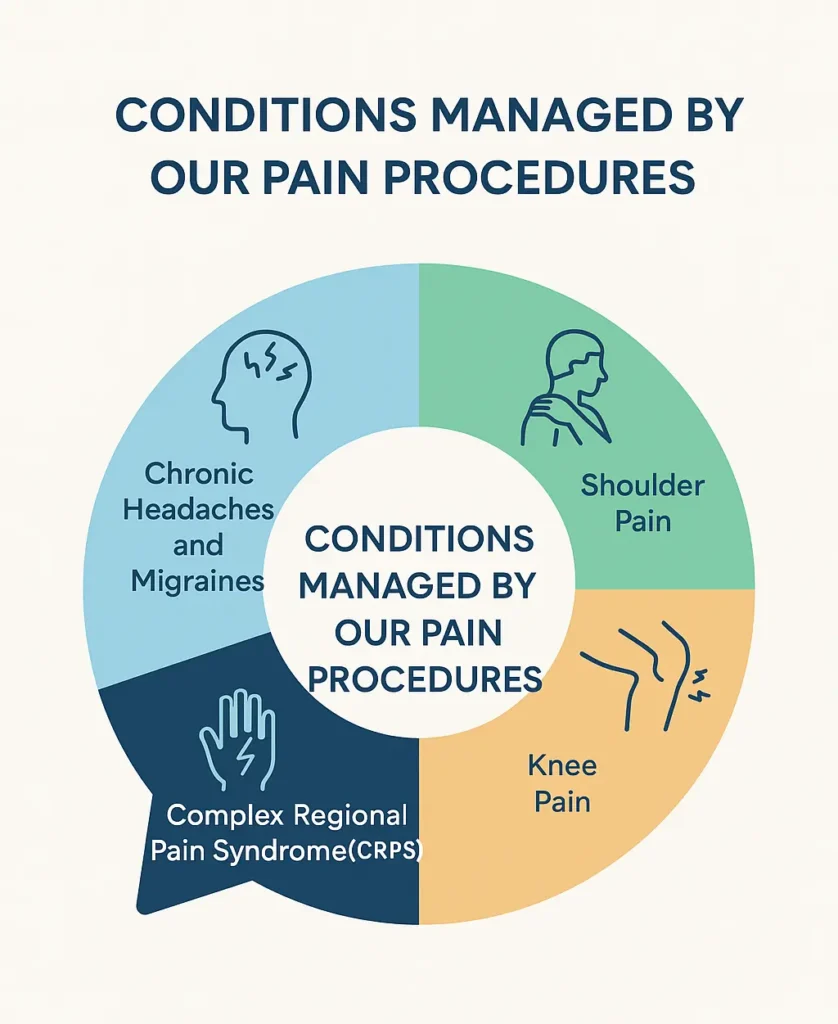Expert Pain Procedures for Chronic Pain Relief
At Sydney PainAid Specialists, we use advanced, evidence-based procedures like nerve blocks, RFA, and spinal cord stimulation to relieve chronic pain and improve quality of life.
At Sydney PainAid Specialists, we use advanced, evidence-based procedures like nerve blocks, RFA, and spinal cord stimulation to relieve chronic pain and improve quality of life.
Pain procedures encompass minimally invasive interventions targeting specific nerves or tissues to disrupt pain signals transmitted to the brain. These techniques are particularly effective for patients who have not found relief through conventional treatments like medications or physical therapy.
Common pain procedures include

We offer advanced interventional pain procedures to treat a wide range of physical and psychological conditions. From chronic headaches, shoulder and knee pain to complex spinal issues and diabetic neuropathy, our targeted treatments—such as nerve blocks and radiofrequency ablation (RFA)—are designed to provide lasting relief.
We also address post-surgical spinal pain and complex regional pain syndrome (CRPS), while our innovative Virtual Reality clinic supports those managing PTSD, depression, and anxiety related to chronic pain.
Our interventional pain procedures are effective in managing a variety of conditions, including
Nerve blocks involve injecting medication near specific nerves to temporarily disrupt pain signals. This can provide immediate relief and help in diagnosing the source of pain.
RFA uses heat generated by radio waves to destroy targeted nerve tissues, preventing them from sending pain signals. The procedure is minimally invasive and typically performed under local anesthesia.
These assessments determine if a patient is a suitable candidate for a spinal cord stimulator implant, which sends electrical impulses to the spinal cord to modify pain perception.
Conducted by experienced physiotherapists and exercise physiologists, hydrotherapy involves water-based exercises that reduce joint stress, alleviate pain, and improve mobility.

Pain procedures offer targeted, minimally invasive relief for chronic pain, often with little downtime. These treatments can improve mobility, reduce the need for medications, and are customized to each patient’s specific condition and goals—helping restore function and enhance quality of life.
Pain procedures are generally safe, but like all medical treatments, they carry some risks. These may include infection, minor bleeding, nerve damage, or allergic reactions to medications. While rare, it’s important to understand and discuss these risks with your specialist to make an informed choice.
While pain procedures are generally safe, potential risks include
It’s essential to discuss these risks with your specialist to make an informed decision.

Relief can last from 6 months to over a year, depending on the individual and condition treated.
Many pain procedures are covered by insurance. We recommend checking with your provider for specific coverage details.
Most patients resume normal activities within a few days, though this can vary based on the procedure and individual response.

Take the first step towards a pain-free life. Our team of dedicated pain specialists in Australia is here to help you navigate your journey to recovery.
Book an Appointment today to start your journey toward safer and more effective pain management.